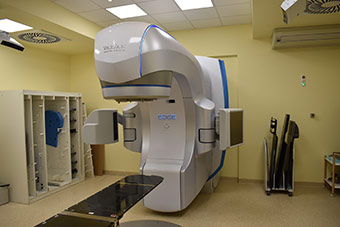The EU has funded two projects to improve the quality, efficiency and effectiveness of cancer diagnosis and treatment in Poland. The first concerned the building of a diagnostic and therapeutic centre at the Gliwice Oncology Centre in the Silesian region, in the south of the country. The second entailed phase one of the replacement of the linear accelerators in the centre’s radiotherapy department.
Better cancer diagnosis and treatment for patients from across Poland
- 30 September 2019
Radiosurgery is currently the most dynamically developing area of cancer radiotherapy. It consists of a single or several very precise bursts of irradiation of a tumour with a high dose of photon radiation, which causes almost immediate destruction of cancer cells.
Under the first project, Gliwice Oncology Centre’s radiology and diagnostic imaging department and cancer pathology department were expanded, and essential diagnostic equipment was purchased.
Under the second, three linear accelerators – TrueBeam, Edge and CyberKnife – were bought, assembled and installed. Bunkers in the radiotherapy department were adapted to house them.
Tackling a major killer
Cancer is one of the main causes of premature death in Poland and Gliwice Oncology Centre is one of the country’s biggest hospitals specialising in tackling the disease. It treats people with primary, metastatic and recurrent tumours from all over the country, with nearly 40 % of its patients coming from outside of the Silesian region.
Work on the diagnostic and therapeutic centre entailed design activities, preparation and development of the site, construction of basic and ancillary facilities, connection of the facilities to public utility infrastructure, installation of equipment, training and technological support. The equipment includes computed tomography (CT), magnetic resonance imaging (MRI) and positron emission tomography (PET-CT) scanners which, combined with the radiopharmaceuticals produced at the centre, facilitate the detection of tumours.
Fast, accurate radiotherapy
Of the three accelerators purchased under the second project the Edge system provides comprehensive radiosurgery and radiotherapy and offers the fastest and most precise delivery of doses of radiation of any device currently on the market. The radiation lasts for just a few minutes, thereby minimising patient discomfort.
The CyberKnife system constitutes a painless, non-invasive alternative to surgery for very precise removal of cancerous tumours with no anaesthesia. It allows tumours to be tracked and patients’ breathing to be monitored, as well as subjecting the tumours to highly accurate irradiation during one or several sessions.
The new devices make it possible to assess and modify the patient's position and radiation exposure on a regular basis. This ensures that the doses administered only reach the diseased tissue, so that healthy tissue is preserved.
Together, the results of the two projects provide support for the diagnostic laboratories, wards and other units at Gliwice Oncology Centre and increase the availability of highly specialised, comprehensive, personalised and round-the-clock cancer diagnosis and treatment. They also help to streamline and optimise treatment processes and contribute to the development of an oncology institute at the centre.
Total investment and EU funding
Total investment for the project “Improving the quality and efficiency of cancer diagnostics by building a diagnostic and therapeutic centre at the Gliwice Oncology Centre/Replacement of linear accelerators at the Gliwice Oncology Centre to improve the quality of and enhance the treatment of cancer — Phase I” is PLN 104 051 910 (EUR 24 000 000), with the EU’s European Development Fund contributing PLN 74 264 202 (EUR 17 000 000) through the “Infrastructure and Environment” Operational Programme for the 2014-2020 programming period. The investment falls under the priority “TO9 - Social Inclusion”.

